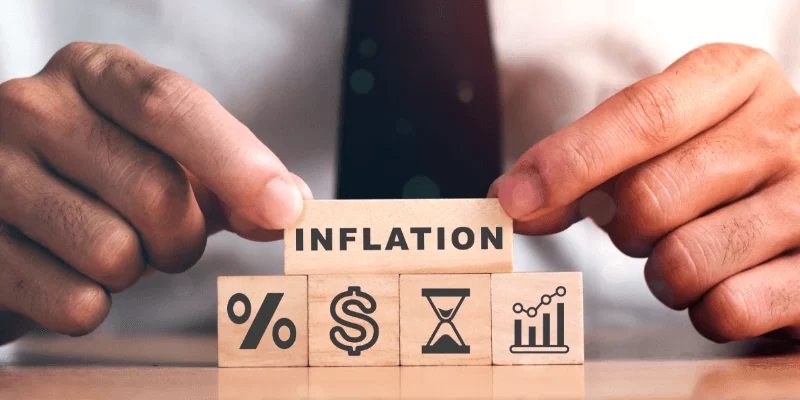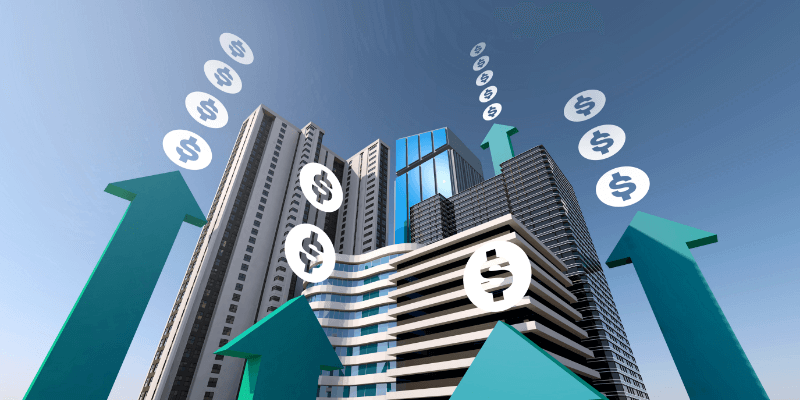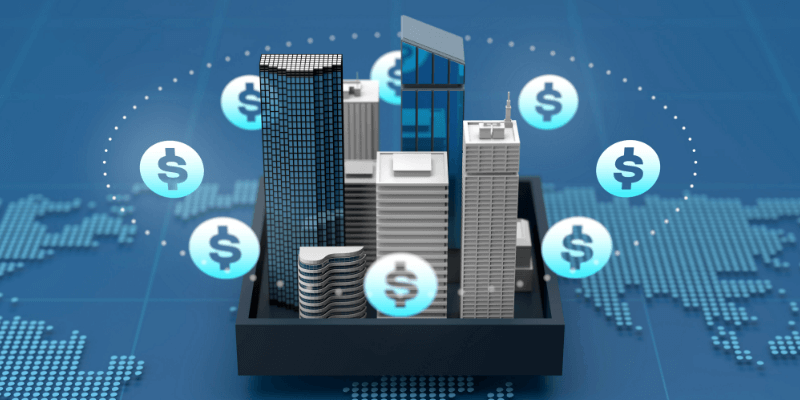Inflation is one of the top headlines in the news these days. It seems like it’s all anyone is talking about. Prices for goods and services in the US are rising at rates unseen in decades. The price of housing has been one of the largest contributors to the inflation rate, but this should be no cause of worry for commercial real estate investors.
Why is this? Commercial real estate investments offer investors benefits that include favorable tax treatment, cash flow, portfolio diversification, capital gains, and protection against inflation. The protection against inflation benefit is one that is commonly misunderstood, and often the one that is most overlooked. To understand this better, let’s take a look at the concept of inflation.
As the price of goods and services rises over time, the result is a sustained drop in the purchasing power of money. Inflation, in other words, means that today’s dollar is worth more than a dollar in the future due to this loss of purchasing power.
Investment returns must be measured in both absolute and relative terms, and inflation must be taken into consideration. As an example, a person could allot money to an investment that pays an interest rate of 4% annually (absolute return). If inflation causes prices to rise by 4% in the same year, the relative return is 0% on the investment because the purchasing power of the capital remains unchanged. It is important that the investment earns a return, but what is more important is that the return outpaces the rise in inflation to ensure purchasing power continues to increase over time.

Commercial Real Estate Trends vs Inflation
Understanding the grounding basics of commercial real estate investment is vital to understanding why this type of investment is such a resilient asset. The saving grace of commercial real estate investing is its lease terms, regardless of whether the property is a small two-floor shopping center or a large industrial complex. Lease agreements offer security to both the lessee and the investor. Tenants are guaranteed a long term commitment for use of the space, and investors have the security of knowing the investment will not go awry in the long term.
Inflation is famous for fluctuation – prices rise and fall like the tide. For this reason, long term commercial real estate investment is especially important. Even during periods of high inflation, commercial real estate investments may take an initial dip, but are one of the first markets to get back on the path to recovery. As a matter of fact, the commercial real estate market is among the few investments that remain rather insulated from the volatility of market fluctuation. Quick recovery times for this asset class are the major reason investors are so eager to make commercial real estate investments.

How Does Commercial Real Estate Protect Against Inflation?
Commercial real estate can protect investors from inflation in three major ways:
- Increases rental income during inflation: It is a fact that rising inflation causes rising prices. This also includes a rise in rents for commercial properties. This results in rental rates that increase while operating expenses remain relatively stable, contributing to positive property values.
Net operating income may also be increased, appreciating property values even more. For investors holding commercial real estate, their investment will not be crippled as long as the value is more than the current rate of inflation. - Lease agreements: A typical lease agreement for commercial property is structured in a way that allows for rent increases at regular intervals over the course of the lease. For example, the lease may contain a clause that states the rent will increase annually at a 2% or 3% rate.
As long as the annual increase in rent outpaces the inflation rate, the relative return on investment will remain positive. - Scarcity of property: As the population continues to increase, so does the need for more buildings, houses, and apartments to house them. On the other hand, this results in decreasing space for commercial property.
Just like the human population, companies also continue to grow and new businesses are opening everyday. The need for commercial real estate is only increasing. In areas where the real estate and commercial center markets are in high demand, limited supply results in price appreciation of commercial real estate, a huge positive for investors.

Commercial Real Estate Investments Outpace Inflation
Typically, the best assets to own during times of high inflation are “hard” assets like gold and real estate. This is because their value tends to rise parallel to inflation. Commercial real estate investment returns come from two sources – income and capital appreciation that work together to defend against high inflation.
Let’s suppose a developer is considering a new industrial property. This developer creates a budget estimate for construction costs, with a financial projection for potential operating expenses and cash flow.
Construction costs tend to rise higher than rent prices in a high inflation environment, and the developer now cannot achieve his or her desired return, and decides to scrap the project. When this happens, there is now one less commercial property available on the market, and with limited supply and strong demand rental prices for existing industrial properties rise.
Commercial real estate assets, regardless of the type of property, are a good defense against rising prices driven by high inflation. Increases in rent drive higher net cash flow and increase property values to outrun inflation over time.

Investing in Commercial Real Estate
The reasons to invest in commercial real estate are very compelling, but how do you get started investing in CRE? What should you look for, where should you invest, and which potential markets should you be on the lookout for?
Investing in commercial real estate requires time, resources, and expertise and involves legalities and formalities. One of the best resources available, and one of the best places to start when interested in a property, is with commercial property appraisal.
It is the commercial real estate appraiser who will examine the property’s ability to provide a positive annual return on invested capital. A commercial appraisal takes into consideration the rent that a property can be expected to earn, the market value of the land or site, and the resale value when the property is sold. The commercial real estate valuation seeks to determine the highest and best use of the property, and then value can be determined.
Commercial appraisal services are vital to examine the property’s ability to provide a positive annual return on invested capital. Since 1990, RDC Appraisals, LLC has been a leader in commercial real estate appraisals in New York and New Jersey. We are experienced in valuing commercial properties of all sizes and for all purposes. You can rely upon our detailed reports to provide you with all relevant information and an accurate valuation. Contact us today to learn more.

